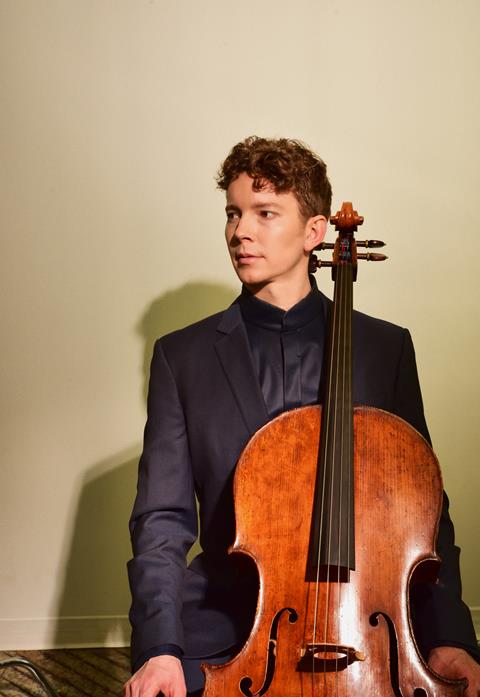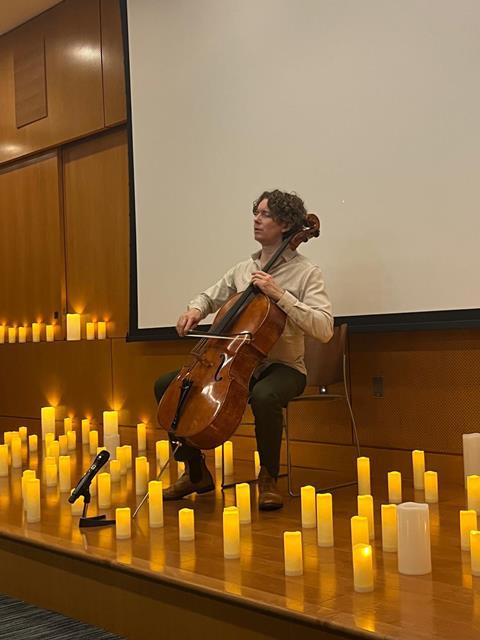US correspondent Thomas May speaks with American cellist and composer Joshua Roman about his new solo album, Immunity, and how it reflects his experience with Long Covid.
 Joshua Roman; photo by Shervin Lainez
Joshua Roman; photo by Shervin Lainez
Discover more Featured Stories like this in The Strad Playing Hub
When the Covid pandemic initially began to unfold, it posed an existential threat to anyone involved in the performing arts. The World Health Organisation declared an end to the pandemic phase in May 2023, but musicians like Joshua Roman continue to struggle with its consequences.
Nothing has been the same for the American cellist and composer since he had his first bout of Covid in January 2021, just after giving a performance of Prokofiev’s punishingly difficult Sinfonia Concertante. Ongoing extreme fatigue and disorientation made him put aside his cello altogether for nearly three months.
Roman was diagnosed later that year with Long Covid and began undergoing rehabilitative treatment to adapt to this chronic condition. Over the last few years, he has had to redefine his relationship to music and his audience, ultimately developing a newfound sense of strength and purpose.
Paradoxically, Roman’s physical and psychological challenges paved the way for the breakthrough represented by his newly released album, Immunity (on the Bright Shiny Things label).
Roman emerged on the scene more than two decades ago as an astonishingly precocious artist. He became the youngest principal in Seattle Symphony’s history when he was appointed that orchestra’s principal in 2006 but left two years later to pursue his career as a soloist. Immunity is in fact his debut solo album and was recorded by Grammy Award-winning engineer and producer Adam Abeshouse.
Now 40, Roman put off making a solo album because of the perfectionist attitude that guided his thinking prior to Covid.
‘We’re only talking about an album release because I got Long Covid. Otherwise, I’d still be waiting to have “the perfect idea”’, the cellist told me in an interview from his home in New York City.
The title Immunity evokes music’s healing power, along with the sense of community he has developed through his special recitals addressed to other people coping with Long Covid. It brings together a widely varied array of pieces, mostly by contemporary composers (including by Roman).
Immunity contains some surprising choices and juxtapositions that represent ‘the music that’s been important to me on my journey with Long Covid so far’.
Roman spoke about how his understanding of his life as a musician has changed and what he hopes to communicate through his new album.
You began your Immunity tour last month, playing for patients suffering from Long Covid at clinics around the country. You’re also touring with your colleagues Tessa Lark and Edgar Meyer for the general public. How are you personally doing now?
I’m not quite back to normal. I’m very fortunate that my primary care doctor in New York already knew about Long Covid back when I started experiencing intense fatigue, brain fog and other symptoms. He encouraged me to take it easy and rest, which is not something that I would have done. I’m glad that he did, because we now know that pushing things under those conditions causes more damage.
You even reached the point of thinking of giving up your career in those first months. How did you work your way back to where you are now, able to perform on tour and envisioning new projects?
I don’t think that I would be where I am now without having reached that point. The energy that I had before Long Covid was masking a lot of deep-seated doubts and frustrations that would come up every once in a while. When they did, I would resolve them through action or avoidance. But because of Long Covid, I couldn’t do either of those. So even though it felt terrible, actually letting those doubts come up during a period where I didn’t have performances to distract me put me in a very vulnerable and open mindset. When I finally did pull the cello out again, it all immediately clicked.
What was happening with those doubts before your Covid experience made you shift gears?
I had wanted to be the perfect conduit for a composer’s intentions. That meant trying to cut myself out of the equation in my musical approach. I was taking it to an extreme and, in my mind, was making everything about service, which makes for a very disembodied experience. So when I had the cello in my arms again and could feel my own almost atrophied relationship to the cello and had that spark of coming back to life, it was very powerful. I’ve been building from that to where I am now. Even though I have less energy, it’s so much more focused because my motivation has been invigorated. And now we’re able to talk about an album release. It’s insane that it took me so long to make my debut solo album.
Read: Returning to performing after suffering from Long Covid
Listen: The Strad Podcast: Exploring resources and finding your teaching style with cellist Guy Johnston

How does Immunity reflect what you’ve gone through?
Each piece on the album represents a moment or a concept that I worked through when I played the piece as relates to Long Covid. From April until the summer solstice the year it started, for example, I didn’t play the cello at all. The Bach Prelude from the Suite No. 1 that opens the album is the first music that I started playing again. Thankfully, my music memory has not been affected, even though other kinds of processing have been. Allison Loggins-Hull’s Stolen was the test piece, because it was the last thing that I had learnt before I got Covid. It’s also a piece that I had learned not only because I loved it, but because it offers a catharsis by taking us into a darkness and a depth that we don’t usually experience, but that music allows us to have. For me, music is not just relaxing. In fact, music is often not relaxing for me. It helps me work through things. That piece is a catharsis of sorts.
It is a fascinating compilation: there’s Mark Summer’s Julie-O, ‘Hallelujah’ by Leonard Cohen, music by Caroline Shaw and Penderecki, George Crumb’s Sonata for Solo Cello – the longest work on the album – and even you playing and singing together with violinist Tessa Lark on the Kansas song ‘Dust in the Wind’. Each of these seems to stands for a different part of your journey.
Yes. For example, I’ve been obsessed with the Crumb Sonata since I was 16 or 17. For someone who’s very visual, I see the colours that he uses. Images pop into my mind, and I have a scene that plays out in the opening but especially in the last movement. That’s one of those pieces that I can never unsee. I was frustrated with this piece for so long because I have such clear ideas about it, which are vivid and compelling, but I never felt like I was able to be technically comfortable enough with the piece to get those across.
I started taking Alexander Technique about four or five months after I got Covid. That economy of energy and use of body, affected my playing in a positive way and gave me a new way of being in touch with my relationship to the cello – and then, all of a sudden, a new way of being in touch with my body.
So I began to put the Crumb Sonata on recital programmes pretty early on in that experience, because I wanted to see whether more focus and clarity meant that I could play better, even though I wasn’t putting as many hours into it as before. And I found that it is so much better. Knowing what I want – knowing how to use my body and being present in a different way – is so much more effective than throwing 12 hours at the cello blindly all the time, every day.
There are some examples of your own music as a composer.
Duet was composed during the mandatory lockdowns, when I was regularly going into an empty recording studio with my own equipment and recording. I was very lucky to have that space, but I was also very lonely. One day, I recorded two tracks and just imagined that I was playing with somebody else.
Tessa Lark [who plays and sings on the track with Roman] is the first new collaborator that I worked with since Covid. I’d never met her before, but [bassist and composer] Edgar Meyer had talked about having us play together. Having her join on this piece just seemed perfect.
Immunity is my first composition since getting Long Covid. Composing was very daunting, and I cancelled a string quartet I was supposed to write because of that. Just before the pandemic, I had finished a Double Concerto for Vadim Gluzman myself and the ProMusica Chamber Orchestra, and even fixing mistakes in the score was taxing for my brain to process. Composing Immunity happened a different way, and it ended up being the most groovy, fun thing I’ve ever written.
What message are you hoping to convey through the new album?
When I play for other Long Covid patients and share and develop this cathartic journey that they can relate to, it takes me to a vulnerable place and allows the other patients to go there as well. It’s about seeing that you don’t have to be who you were before to have a good life. The basic message is accepting that where you are doesn’t mean you have to give up on yourself or on life.
As a perfectionist, I put off doing an album for so long because I held onto this abstract, unattainable ideal, but the album is me finally saying: This matters enough for me to put this music out.
Also, the album covers a wide ground and represents a snapshot of my view. It’s not the whole view, but these pieces fit together. If you describe the styles of these pieces, one after the other, you wonder: what do they have to do with each other? But when you listen to the album, I feel that there’s an arc, a throughline. I love that, because I think it demonstrates that the music that’s important to you doesn’t have to be the same as what’s important to everybody else, and it can still make sense. It can still have meaning. The main point is that it’s about connection and vulnerability.
Read: Julia Hagen makes her Vienna Philharmonic debut at the Lucerne Festival
Read: Joshua Bell and Steven Isserlis on their passion for Mendelssohn
Discover more Featured Stories like this in The Strad Playing Hub
The number one source for playing and teaching books, guides, CDs, calendars and back issues of the magazine.
In The Best of Technique you’ll discover the top playing tips of the world’s leading string players and teachers. It’s packed full of exercises for students, plus examples from the standard repertoire to show you how to integrate the technique into your playing.
The Strad’s Masterclass series brings together the finest string players with some of the greatest string works ever written. Always one of our most popular sections, Masterclass has been an invaluable aid to aspiring soloists, chamber musicians and string teachers since the 1990s.
The Canada Council of the Arts’ Musical Instrument Bank is 40 years old in 2025. This year’s calendar celebrates some its treasures, including four instruments by Antonio Stradivari and priceless works by Montagnana, Gagliano, Pressenda and David Tecchler.













































No comments yet